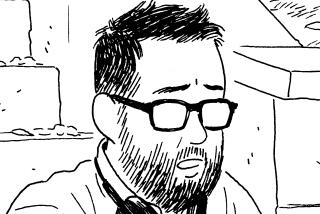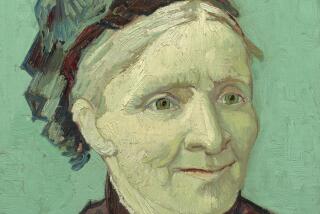PRIVATE FACES, PUBLIC PLACES : Portrait of an Invisible Man
- Share via
Parking lots, like all human communities, have a character of their own. On Sundays, the one opposite the County Museum has about it the faintest whiff of self-satisfaction. Those who drive in to pay the $3 all-day charge cannot but be aware that on this burning summer’s day, they are not at the beach nor at the movies, but about to brush shoulders with Art.
Art is about communication, man to man, spirit to spirit. Watch the drivers as they pull up to the parking attendant’s booth: the brusque silver wolves in hand-waxed imports, thrusting money out into the air. The self-involved in sunny convertibles who snatch the change without a “thank you.” The women whose whining voices complain about everything: the lack of shade, the absence of valet parking, the world that does not love them still or quite enough.
Watch the attendant’s face droop at such hardness, his imperceptible sigh. See, too, the pride and warmth with which he jumps to deliver change and greetings to the people who smile and thank--who notice that another man has crossed their lives, if only for the small change of seconds.
Omar Faruq stands at his booth for eight hours every Sunday. This is his “spare-time” job. His legs ache, his head often, too; there is no trick to hard work. He takes the trouble to iron his trousers and shirt, his uniform. His bearing is hard to place at first but familiar from 100 old paintings across the way: the devoted servant--an un-American posture, to be sure.
Between cars, he tidies his booth: stacking the decks of tickets, straightening the money in the drawer, fussing with the tasks of the proud office-wallah, functionary of importance. “In my country . . .” he is fond of saying. In Bangladesh, his country, there is an old and great civilization, and floods, famine, war and pestilence: the miasma of geography and imperialism. On Wilshire Boulevard, who remembers or cares about the mighty Nawab of Bengal?
Omar is not afraid of work: 58 hours a week, six days a week. As a teen-ager, he left Bangladesh to work in Qatar for two years: $500 a month, but also the back-breaking loneliness of being a Bengal Muslim to the proud and austere Gulf Arabs, oil rich. He looks much older than he is--29--with eyes bruised by fatigue. He loves America now, because his wife, Shameema, loves to be here. She was 16 when he saw her in the market and asked her mother for her hand; she was 17 when their son, Shamrat, “little emperor,” was born.
America has given him a new black Buick: “In my country, a man would work all his life for such a car.” Unfortunately, before the Buick, there was the 10-year-old Datsun and the Honda with 75,000 miles on the clock, the fear every day of new repairs. And before there was a car at all, there was the bus: getting up at 4 every morning for the two-hour ride to his parking duties at Century City. Eventually, he was promoted: sent to work nights downtown, to have a gun at his throat. Twice. Now, the company has made him manager of a garage on Wilshire Boulevard: three floors of cars, a small kingdom to rule wisely and attentively with an old desk and chair where he eats his lunch.
Some of his “monthlies” smile and call him by the name written on his white shirt. He is proud to be noticed. Someone brought him a doughnut once for breakfast; he talks of it as if he was presented with a king’s ransom. Someone else wrote to the head office to complain that he had not jumped quickly enough to attention. A thoughtless letter from a hard woman--and he feared for his job, for the rent for the one-bedroom apartment. In her self-righteous moment of complaining, did she ever wonder about this man, whether he had a wife and child, the life beyond the windshield of her car?
“Sometimes, if I am sick, I am afraid,” he says. “My company is very nice to us, and so in six years, I have never called in a sick day. Sometimes I feel very sick. One day I worked all day before going to the hospital. It was appendicitis and I was away one week. It was a very bad week.”
His wife works every day at McDonald’s and worries about the holidays when her son, now 6, is not at school. One day, they hope to have another child. “I want very much to have one child born in America--when I can afford to support him.” He wants an American child to honor the country which, as he sees it, has been good to him. “Whatever right you have, I have the same right. Human rights. I like that.”
His wife earns $4.25 an hour at McDonald’s. Some time ago, he found $2,000 in cash in a woman’s car and rushed to hand it in. Did it not tempt him, even for an instant? “That lady could have lost her job, terrible things could have happened to her,” he explains.
Now and again on a Sunday, he pictures in his mind Shameema and Shamrat, at home with his parents-in-law, who make shoulder pads all week, and on this one precious day relax with friends who remember life on the banks of the Burigonga.
The impatient hoot when his mind wanders thus; the immobile figure in black and white is there to stand and serve. And they scurry by, hastening to see Art and missing the picture before them.
More to Read
Sign up for The Wild
We’ll help you find the best places to hike, bike and run, as well as the perfect silent spots for meditation and yoga.
You may occasionally receive promotional content from the Los Angeles Times.






